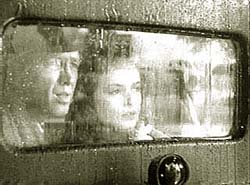I watched Local Hero because it's the story of business vs. environment and town vs. corporation. Call it research. But the conflict between opposing forces is as anti-operatic as you'll find in any film. In fact, by any standard today - any of mine - the plot bored me. Though the action is droll, the characters reveal few new facets as we come to know them, and the only apparent complication develops out of limp negotiations between Mac and Gordon.
Ben, who actually owns the ancient beach, provides the final second act obstacle. There are enough major characters interested in this spot for reasons other than money that when Happer changes his mind about building the sprawling refinery, the audience had been waiting for it for at least a half hour. Unaccountably, the townspeople who would have been enriched, for no apparent reason, don't feel had. Everything's fine.
Twenty four years after seeing Local Hero for the first time, I've lost a lot of my vaguely remembered respect for it. But I've lost little of my youthful affection. It's not a well-made story. In many places, the acting is so contained that I can't tell whether to blame Scottish reserve, unexportable drollness of the British Isles, or a very tired cast. But it is sweet, patient, and dry, like Forsyth's more successful story Comfort and Joy.
Finally, Local Hero is a story of an American fish out of water in a Scottish fishing village who comes to feel that his life is empty by comparison with what he finds in Furness. (Though at least one pilgrim looking for what Mac found had some of her visions of Local Hero badly shaken.). But it's also Forsyth's homage to a place where the sky is full of wonder and mythical creatures still swim off shore. Mac falls in love with something there - we don't see it dramatized - and it seems that that indefinable thing is Scotland. The story may not show it, but the writer director implies it.

The single new delight come from the only truly dramatic moment of the second act. The town has learned that Ben is stalling the deal that will make them all millionaires and it looks less and less likely he'll budge. He teeters out of the ceilidh ("KAY-lee"), a drunken town dance, and finds a knot of locals eager to pursuade him to sell. Mac and Gordon follow Ben to his beach shack to insure his safety. But once they're on the sand, the late-sun setting hanging over the ocean, it appears the whole town has streamed out of the hall to confront the old beachcomber. They trot in from all directions, stop in silouhette, and wait as if to see who will start this dirty work. From the sea's horizon though, what looks like the last sliver of sun wavers and, by god, gets bigger, closer, whiter. It's Felix Happer's helicopter. The superstitious old exec. has come to see the sky and negotiate with Ben directly. The surprise of that reversal and it's visual execution is so delightful, the moreso because the scale of action and dramatic tricks is set so low throughout the movie.



No comments:
Post a Comment